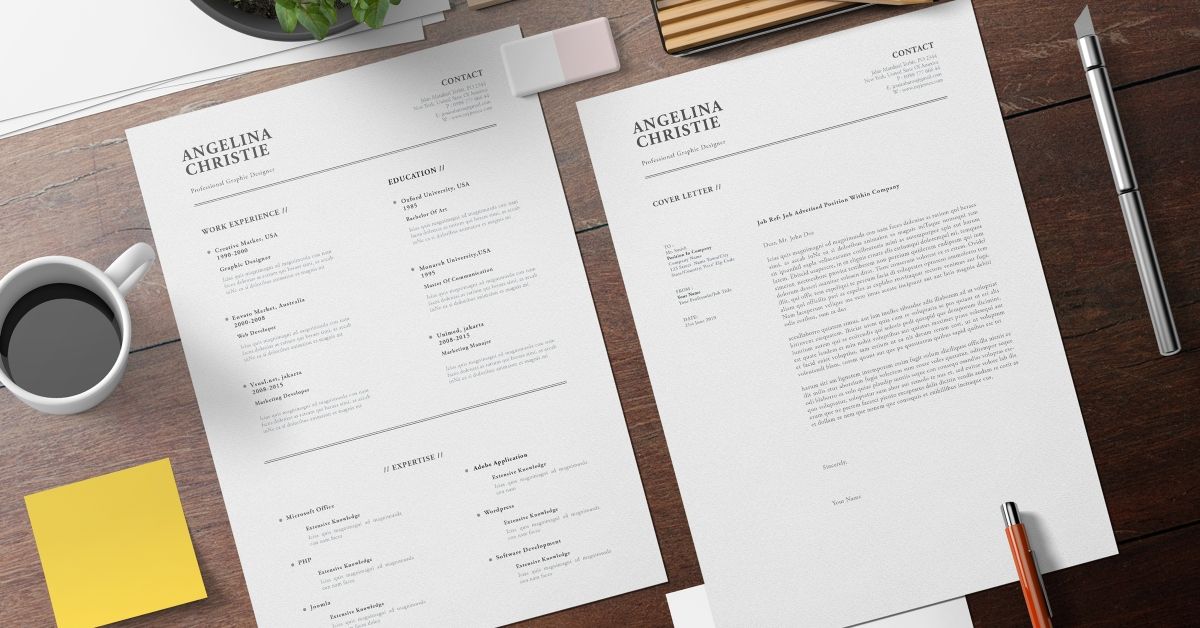- Career Blog

Writing a Winning Job Application Letter: Tips and Examples

A job application letter, also known as a cover letter, is a formal letter that accompanies your resume and introduces you to a potential employer. The purpose of a job application letter is to highlight your qualifications, experience, and skills that make you the perfect candidate for the job. It also helps employers understand your personality, work ethic, and how you plan to contribute to their organization.
Importance of Customization
One of the key factors that can make or break your job application letter is how well you customize it to the specific job you are applying for. Employers want to see that you have taken the time to research their company and understand what they are looking for in a candidate. Customizing your letter also shows that you are genuinely interested in the job and that you are willing to put in the extra effort to stand out from other applicants.
Brief Overview of Key Sections
While job application letters can vary slightly depending on the job and industry, they typically contain four key sections:
Introduction: This section should include a brief introduction, the job you are applying for, and how you found out about it.
Qualifications: In this section, you should discuss your qualifications and experience that make you a good fit for the job. Be sure to tailor this section to the specific job requirements to show that you have the skills they are looking for.
Skills: Here, you should highlight your relevant skills and how they apply to the job. Use examples from your past experiences to demonstrate your proficiency in each skill.
Closing: The closing paragraph should thank the employer for considering your application and provide contact information for them to reach you.
In this article, we will dive into each of these sections in more detail and provide tips and examples to help you write a winning job application letter.
Understand the Job Requirements
To write a winning job application letter, it is important to thoroughly understand the job requirements. This involves analyzing the job description and understanding the needs of the employer, as well as tailoring your letter to attract the specific employer.
A. Analyzing the Job Description
The job description provides you with valuable information about the position you are applying for. It outlines the required skills, qualifications, and responsibilities of the job. By analyzing the job description, you can determine if the role is a good fit for your experience and qualifications.
When analyzing the job description, it is important to pay attention to key phrases and requirements mentioned. These can give you insight into the priorities of the employer and allow you to tailor your application to meet those priorities.
B. Understanding the Needs of the Employer
To write a winning job application letter, it is also essential to understand the needs of the employer. This means researching the company and the industry to get a better understanding of the company culture, mission, and values. It also means understanding the desired outcome of the position and how you can address the employer’s needs.
One way to convey your understanding of the employer’s needs is to highlight relevant accomplishments in your application letter. By showing how you have successfully addressed similar challenges in the past, you can demonstrate your potential value to the employer.
C. Tailoring the Letter to Attract Specific Employer
Finally, to write a winning job application letter, it is important to tailor your letter to attract the specific employer. This means using language and examples that relate to the specific company and its values. It also means customizing your application letter to the specific job and its requirements.
To tailor your letter, take the time to research the company and its values. This can involve reviewing their website, social media, and other online resources. By addressing the specific needs and values of the employer, you can show that you are invested in the position and the company.
To write a winning job application letter, it is important to understand the job requirements, analyze the job description, understand the needs of the employer, and tailor the letter to attract the specific employer. By doing so, you can craft an application that stands out from the competition and showcases your value as a candidate.
Research the Company and Industry
Before writing your job application letter, it’s important to research the company and industry thoroughly to increase your chances of writing a winning letter. Here are three key areas to focus on:
A. Understanding the Mission, Vision, and Values of the Company
Make sure you take the time to research the company’s mission, vision, and values. This will help you understand the company’s goals and the qualities they look for in employees. You can find this information on the company’s website, social media pages or company annual report.
Incorporate the values and mission statement of the company into your job application letter. This highlights your alignment with the company culture, and how your beliefs and goals match that of the organization’s.
B. Identifying the Company’s Competition
Once you have an understanding of the company, you need to identify the company’s competition. Knowing who the competitors are can help you understand the industry as well as the company’s market share position.
List the company’s competitors in your job application letter and briefly explain how you see the company’s strengths overcoming the competitors’ weaknesses.
C. Industry Trends and How to Address Them
The final area to focus on when researching the company and industry is identifying current industry trends and how these trends may impact the company’s future. Use reputable sources to gather trends and predictions about the industry. This will also show the recruiter that you are not only familiar with their industry, but are engaging in informed discussion and contributing to innovative solutions.
Incorporate industry trends into your job application letter and showcase the ideas and innovations you bring, how leveraging them can enhance the company’s position and how you can contribute to any current and future challenges, for which the potential employer has yet to find a solution.
By researching and incorporating the above areas into your job application letter, you demonstrate a genuine interest in the organization and showcase clear understanding, innovative thought and how your expertise can improve the company’s performance.
Know Your Strengths and Skills
When writing a job application letter, it’s crucial to understand your unique selling proposition, relevant experience, and transferrable skills. This information will help you stand out from the other applicants and potentially land the job of your dreams.
A. Identifying Your Unique Selling Proposition
Your unique selling proposition (USP) is what sets you apart from the other candidates. It could be a specific skill, experience or personality trait that aligns with the company’s values and job requirements. Start by analyzing the job description and researching the company culture to identify what makes you an ideal candidate for the role.
Once you have identified your USP, use it as the main selling point in your job application letter. Highlight your strengths and skills and explain how they align with the job requirements and the company’s values. This will show the hiring manager that you are not just another candidate, but someone who has something valuable to offer.
B. Highlighting Your Relevant Experience and Accomplishments
Your work experience and achievements are essential in demonstrating your abilities and suitability for the job. When crafting your job application letter, focus on highlighting your relevant experience and accomplishments. Use specific examples to demonstrate how you have contributed in previous roles and how those skills could be applied to the new role you are applying for.
Be sure to use metrics whenever possible as numbers are a great way to showcase your achievements. For example, if you were able to increase sales revenue by 20% in your previous role, mention it in your letter. This will give the hiring manager a clear understanding of your capabilities and how they align with the job requirements.
C. Understanding How to Leverage Transferrable Skills
Transferrable skills are those abilities that you have gained from your previous experiences that are not necessarily related to the job you are applying for. They can be valuable in demonstrating your adaptability and ability to learn quickly.
When discussing your transferrable skills in your job application letter, highlight how they could be applied to the new role you are applying for. For example, if you have strong communication skills, explain how you could use that to effectively collaborate with team members and clients.
By understanding and leveraging your unique selling proposition, relevant experience and accomplishments, and transferrable skills, you can write a job application letter that stands out from the crowd. Remember to tailor your letter to the job requirements and company culture to increase your chances of success.
Address Gaps in Your Resume or Experience
When applying for a job, it’s important to consider any gaps in your resume or experience that might be a red flag for hiring managers. Addressing these gaps upfront can demonstrate your accountability and willingness to take ownership of your shortcomings.
A. Taking ownership of failings
If you have gaps in your work history or experience, don’t try to hide or make excuses for them. Instead, take ownership of any failings and show that you’re actively working to improve yourself. This could involve taking courses, pursuing certifications, or volunteering in relevant areas to gain hands-on experience.
B. Finding a workaround for unfilled requirements
Sometimes a job posting requires specific qualifications or experience that you don’t have. In these cases, it’s important to find a workaround that demonstrates your ability to still meet the employer’s needs. This could involve highlighting related experience or transferable skills that could compensate for the missing requirement. Alternatively, it might involve offering to take on additional training or work with a mentor to acquire the missing knowledge.
C. Highlighting transferable skills to counter an irrelevant job background
When applying for a job in a new industry or field, it’s common to have a background that might not seem directly relevant. However, this doesn’t necessarily mean you’re unqualified for the role. By highlighting transferable skills, such as leadership, problem-solving, or communication, you can demonstrate your ability to adapt to new situations and learn quickly.
Addressing gaps in your resume or experience is an important aspect of writing a winning job application letter. By taking ownership of your failings, finding workarounds for unfilled requirements, and highlighting transferable skills, you can position yourself as a strong candidate and increase your chances of landing the job you want.
Crafting an Attention-grabbing Opening Paragraph
In the competitive job market, first impressions matter. The opening paragraph of your job application letter is your opportunity to make a positive and lasting impression on potential employers. In this section, we’ll explore the importance of crafting an attention-grabbing opening paragraph and provide tips and examples on how to do so.
A. Importance of First Impressions
Studies show that it takes less than 30 seconds for a recruiter or hiring manager to form an initial impression of a job candidate. This means that your opening paragraph is a critical component of your job application letter. Your goal is to capture the employer’s interest and convince them to continue reading.
B. Creative and Engaging Opening Lines
One effective way to capture the employer’s attention is by starting your letter with a creative and engaging opening line. This can be a quote, a personal story, a relevant statistic, or a bold statement. The key is to be authentic and genuine while still standing out from other applicants.
C. Strategies for Catching the Employer’s Attention
Beyond the opening line, there are several strategies you can use to further capture the employer’s attention. These include highlighting relevant skills and experience, demonstrating enthusiasm for the position and company, and connecting your qualifications to the job requirements.
By following these tips and examples, you can craft an attention-grabbing opening paragraph that sets you apart from the competition and piques the employer’s interest.
Highlighting Your Accomplishments
When it comes to writing a winning job application letter, highlighting your accomplishments is crucial. This allows potential employers to see the proven results that you can bring to their organization. Here are a few tips on how to effectively highlight your accomplishments:
A. Demonstrating Achievements in Previous Roles
One of the most effective ways to demonstrate your achievements is by highlighting your accomplishments in your previous roles. This shows that you have a track record of success and can bring that success to your next job. When highlighting your achievements, make sure to focus on results, not just responsibilities. Instead of stating that you managed a team, highlight the specific results that you achieved as a team leader.
For example, instead of saying, “Managed a team of 10 employees,” you could say, “Led a team of 10 employees to achieve a 25% increase in sales within the first quarter.” This shows the impact you had in your previous role and gives potential employers an idea of what you can achieve in their organization.
B. Using Data to Support Accomplishments
Using data to support your accomplishments is a powerful way to illustrate the impact you had in your previous roles. This could include data such as sales figures, customer satisfaction ratings, or employee retention rates. When using data, make sure to include specific numbers and percentages.
For example, instead of saying, “Improved customer satisfaction,” you could say, “Increased customer satisfaction ratings by 15% through implementing a new customer service training program.” This demonstrates the impact you had on the organization and the value you can bring to a potential employer.
C. Highlighting Relevant Certifications and Awards
Another way to highlight your accomplishments is by showcasing any relevant certifications or awards you have received. This shows that you have taken the time to invest in your professional development and have been recognized for your achievements.
When highlighting certifications and awards, make sure to explain why they are relevant to the job you are applying for. For example, if you are applying for a marketing position, highlighting your Google Analytics certification would be relevant as it demonstrates your analytics skills.
Highlighting your accomplishments is a crucial part of writing a winning job application letter. By demonstrating your achievements in previous roles, using data to support your accomplishments, and highlighting relevant certifications and awards, you can show potential employers the value you can bring to their organization.
Showcasing Your Writing Skills
When it comes to writing a winning job application letter, showcasing your exceptional writing skills is crucial to increase your chances of getting hired. Employers often look for applicants who have a way with words, can express themselves clearly, and can craft compelling content that leaves a lasting impression. Here are several ways to showcase your writing skills:
A. Highlighting experience in writing
One of the most effective ways to showcase your writing skills is to highlight your experience as a writer. This can include previous work experience in writing-related fields such as journalism, marketing, or content creation. If you have a writing degree, mention it. You can also share published articles or blog posts that you have written to demonstrate your skills in action. Highlighting relevant experience shows that you have the skills needed to excel in the role you are applying for.
B. Incorporating keywords
Incorporating keywords relevant to the job posting can also help showcase your writing skills. Employers often use applicant tracking systems (ATS) to scan resumes and cover letters for specific keywords related to the position. By including these keywords, you can increase your chances of getting past the initial screening process and showcase your understanding of industry-specific language.
C. Proper grammar, spelling, and tone
Finally, it’s essential to ensure that your writing exhibits proper grammar, spelling, and tone. Errors in these areas can undercut the impact of your application letter and send the wrong message to your potential employer. Take the time to proofread your cover letter and resume carefully, and have someone else review them too. Double-check for proper punctuation, spelling errors, and that your tone fits the professional context.
Showcasing your writing skills is critical when applying for jobs, particularly those that require excellent communication skills. Highlighting relevant experience, incorporating keywords, and ensuring proper grammar, spelling, and tone are strategies that can help set you apart from other applicants and make a lasting impression on potential employers.
Using Power Words and Phrases
When writing a job application letter, it is essential to use powerful words and phrases that can help you stand out from the crowd. Here are some tips to help you select the right words:
A. Selecting Strong Action Words
Action words can help demonstrate your skills and experience effectively. Use verbs that showcase your achievements and contributions to your previous roles. For instance, rather than saying you “assisted” your team, use words such as “led,” “managed,” or “initiated” to emphasize your role in driving projects and initiatives forward.
B. Avoiding Common Clichés and Buzzwords
Although buzzwords and clichés may seem tempting, they could potentially undermine the impact of your letter. Instead of using cookie-cutter phrases like “I am a team player,” try to use specific examples to illustrate your ability to work collaboratively. Also, avoid jargon that may not be familiar to the reader and opt for straightforward language that can be easily understood.
C. Crafting Impactful and Persuasive Sentences
To make your letter more impactful and persuasive, use language that emphasizes your strengths and accomplishments. Start sentences with action words and focus on the results you have achieved. Also, be specific and illustrate your points with concrete examples that demonstrate your value to the prospective employer.
When writing your job application letter, make sure to choose powerful words that demonstrate your expertise and experience effectively. Avoid using clichés and buzzwords and instead focus on crafting persuasive and impactful sentences that showcase your strengths and contributions. By following these principles, you can create a compelling letter that increases your chances of landing the job you want.
Formatting and Presentation of Your Job Application Letter
When it comes to writing a winning job application letter, the presentation and formatting of the letter are just as important as the content. Here are some tips to ensure your letter looks professional and polished:
A. Ensure consistency in formatting
Make sure your letter has a consistent format throughout. This means using the same font and font size for the entire letter. Also, ensure that the margins and spacing are consistent from beginning to end.
B. Proper use of fonts, margins, and spacing
Use a standard font like Times New Roman or Arial, in a legible size (such as 11pt or 12pt). Be sure to use proper spacing between paragraphs and section headers. It’s important to have enough white space to make the letter easy to read, but not so much that it takes up unnecessary space.
C. Guidelines on length of the letter
Longer letters can seem rambling and may deter the hiring manager from reading the whole thing. Focus on the most important points and make them clear and succinct. Remember, your goal is to make a strong case for yourself as a candidate, not overwhelm the reader with information.
By following these tips, you can ensure that your job application letter looks professional, polished, and focused on what matters most – your qualifications for the job.
Sample Job Application Letter
Writing a winning job application letter is important if you’re looking to impress the hiring manager and land your dream job. In this section of the article, we’ll walk through a sample job application letter, analyze its strong points, and provide strategies to improve it.
A. Walk Through a Sample Job Application Letter
Dear Hiring Manager,
I am writing to express my interest in the position of Marketing Manager at ABC Company, as advertised on [job board]. With over [number] years of experience in the marketing industry, I believe I have the skills and knowledge to succeed in this role and make a significant contribution to your team.
During my time at XYZ Company, I was responsible for developing and executing successful marketing campaigns that exceeded client expectations and resulted in increased ROI. My experience in digital marketing, social media management, and content creation have prepared me well for this role. I am highly adaptable, and I have a proven track record of implementing innovative strategies to achieve business objectives.
In addition, I am a strong communicator and collaborator, and I work well in cross-functional teams. I am confident that my skills and experience make me a strong candidate for the role of Marketing Manager at ABC Company.
Thank you for considering my application. I look forward to the opportunity to discuss my qualifications further.
Sincerely, [Your Name]
B. Analyzing the Strong Points in the Letter
The sample job application letter has several strong points:
- The candidate clearly expresses their interest in the position and summarizes their skills and experience in the marketing industry.
- The letter highlights the candidate’s successful track record in executing marketing campaigns and achieving business objectives.
- The candidate demonstrates their adaptability and ability to implement innovative strategies.
- The letter emphasizes the candidate’s communication and collaboration skills.
C. Strategies to Improve the Letter
To improve the sample job application letter, consider the following strategies:
- Start with a strong opening sentence that grabs the hiring manager’s attention, such as a personal anecdote or a statement about the company’s mission.
- Use specific examples of your achievements and accomplishments to demonstrate your value to the company.
- Customize your letter to the specific job and company by conducting research and referencing relevant company initiatives or values.
- Show enthusiasm and a willingness to learn by expressing interest in the company’s future projects or goals.
By implementing these strategies, you can enhance your job application letter and increase your chances of landing an interview with your dream company.
Writing a winning job application letter requires attention to detail, strong communication skills, and a clear understanding of the hiring company’s needs and values. By following these tips and analyzing examples such as the one above, you can take your job application letter to the next level and stand out from the competition.
Related Articles
- The Easiest Part-Time Jobs: Maximizing Your Income in 2023
- Information Technology (IT) Cover Letter: Samples & Tips
- Package Handler Resume: Winning Examples for 2023
- 10 Photographer Resume Examples That Secured Jobs in 2023
- The Business Resume Guide: 10+ Samples & Examples for 2023
Rate this article
0 / 5. Reviews: 0
More from ResumeHead

- Search Search Please fill out this field.
- Career Planning
- Finding a Job

Cover Letters
Types of job search letters with examples.
:max_bytes(150000):strip_icc():format(webp)/ADHeadshot-Cropped-b80e40469d5b4852a68f94ad69d6e8bd.jpg)
Are you starting a job search? To job search effectively, you'll need to use a variety of communications. Whether it's writing a cover letter to send with your resume, inquiring if an employer you'd love to work for is hiring, or sending a quick email or LinkedIn message to a networking content, it's easier to start with an example or template than it is to write a brand new letter from scratch.
Review the most frequently used job search and career-related letters, including application letters, cover letters, inquiry letters, referral cover letters, prospecting letters, and other types of letters used to apply for jobs or inquire about jobs, plus examples of each type of letter and when to use them.
Career Networking Letters
Networking letters are used to request job search advice and assistance from your business or personal connections. These include introductions, referrals , meeting requests, and requests for career advice . These letters can be sent to people you know or to people to whom you were referred. They may be sent by mail, email, or via networking sites such as LinkedIn.
Cover letters typically provide detailed information on why are you are qualified for the job you are applying for. Effective cover letters explain the reasons for your interest in the specific organization and identify your most relevant skills or experiences. Cover letters are sent or uploaded with a resume when applying for jobs. Use these examples of professionally written cover letters to get ideas for your job search correspondence.
Email Cover Letters
When you're sending an email cover letter , it's important to follow the employer's instructions on how to submit your cover letter and resume and to make sure that your email cover letters are written as well as any other correspondence you send.
Inquiry Letters
An inquiry letter is sent to companies that may be hiring, but haven't advertised job openings. Inquiry letters should contain information on why the company interests you and why your skills and experience would be an asset to the company. Also, provide information on how you will follow-up and your contact information.
Job Application Letters
An application letter is sent or uploaded with your resume when applying for jobs. The job application letters you send explain to the employer why you are qualified for the position and why you should be selected for an interview. Writing a letter with your job application is a way to highlight your most relevant qualifications for the job and bring them to the attention of the hiring manager.
Letters Asking for Job Search Assistance
Your friends, family, former colleagues, alumni from your alma mater, and your professional and personal connections can all help with a job search. Here are examples of letters to ask for job search help, including letters announcing a job search, networking letters and letters to request assistance with a job hun
Letters of Interest / Prospecting Letters
A letter of interest , also known as a prospecting letter, is sent to companies to let them know you are interested in jobs that may be currently open or become available in the future. Sending one is an excellent way to reach out to companies you have an interest in working for but haven't advertised job openings.
This is one type of letter that may make more of an impact if it's printed and mailed than if it's sent as an email which may never get read.
LinkedIn Invitations and Messages
LinkedIn makes it very easy to invite people to connect with you and to message your connections to request job or career advice, or to ask them to write you a recommendation. Even though it's simple to do, your LinkedIn communications should be polished and professional, so you leave the reader with the best possible impression.
Referral Cover Letters
When you are applying for jobs, a referral can go a long way. Hiring managers and recruiters are more likely to take a closer look at candidates who were referred by someone they know. When you mention a referral in your cover letter , be sure to mention the individual who referred you by name and also indicates your connection with the person.
Summer Job / Internship Cover Letters
When you're writing a cover letter for a summer job or internship , your cover letters should reflect why you are qualified and interested in the position. It's also a good idea to mention your availability if the job posting mentions a start and end date for the position.
Select the Right Type of Cover Letter
Be sure to choose a type of cover letter that reflects how you are applying for the job or the type of job search assistance you are requesting. Your cover letter should be designed specifically for the purpose you are writing and customized for each position you seek.
The Ultimate Guide to Job Hunt - Land Your Next Job in 2024

Looking to land your dream job, but not sure where to start?
We don’t blame you - job hunt is far from easy. You need to:
- Find the jobs that are a perfect match for your skills.
- Edit your resume to perfection.
- Write that pesky cover letter.
- Answer all those interview questions.
- And that’s just the start.
If all that feels overwhelming for you, you’re not the only one. A lot of people consider job-search to be a scary, daunting process .
But here’s the thing: it doesn’t have to be. The main reason people consider job search to be hard is that they don’t really understand it too well. After all, job searching is a skill on its own.
If you know the ins and outs of resume creation, job interviews, and all other pieces of the process, you’ll see that the job-search process is actually very easy!
This brings us to this guide. We wanted to create the most comprehensive guide to job hunt in the world , something that can turn a job search newbie into an expert in no time! And, well, hope we succeeded!
- Write an Irresistible Resume (That’s Also ATS-Friendly)
- Create a Convincing Cover Letter (That Doesn’t Look Like a Copy-Paste)
- Ace the Upcoming Interview (Even If You’re an Introvert)
But first, let’s start with the basics:
What Does Job Hunting Mean?
Job hunting, job seeking, or job searching is the process of looking for employment, whether it’s because of unemployment, dissatisfaction with the current role, or any other reason.
The job hunt process usually looks something like this:
- Define your career goals. What kind of role are you looking for? Do you want to stick with your current field, or make a career switch?
- Create a resume. Write a resume that’s easy to read, concise, and convincing.
- Pick job boards you want to use. There are dozens of job boards in just about any country. Pick the ones you want to use.
- Apply Rationally. When applying for jobs, don’t spray and pray. Instead, apply specifically for the companies and positions you’re a good fit for.
- Research companies you want to apply for. Don’t just blindly apply for positions - research the role and the company and see if they’re a good fit for you.
- Write a tailored cover letter. Don’t just use a copy-paste cover letter template. Explain to the recruiter why you’re a good fit for the role AND for the company.
- Tailor your resume to the role. Don’t just submit the same resume to every position. Tailor it based on what skills and experiences each employer is looking for.
- Ace the interview. Memorize the common interview questions, practice, and ace the interview.
- And most importantly, get hired!
In this article, we’re going to cover each of these steps one-by-one, starting with #1!
And no, job search isn’t something you do in one evening. You don’t just decide to look for a job on Monday, submit 2-3 applications, get a call for an interview, and land the job.
We wish it was that easy!
In fact, the average job search process can take up to 5 months from the day you submit your first application, to the day you get hired.
What this means is that you should be looking for your new position proactively and on-the-go. You should submit 5-10 relevant applications every day, 5 days a week.
Step #1. Define Your Career Goals
Before you even get started with the job hunt, you need to decide on your exact career goals.
When thinking about your career goals, think about it strategically.
First, define where you want to be in 5-10 years. Do you want to be in a management position or a more senior role?
Then, define what kind of skills and experiences you’d need in order to get hired for that position.
Finally, look for the positions that are likely to give you the skills and experiences to get you to that level.
Some other things to consider at this stage are:
- Are you applying for a similar position to what you have now?
- Are you completely switching careers? In that case, you might want to learn how to make a career change resume .
- Where do you want to be in 5 years’ time? How is the job you want to apply for going to help you get there?
- Are you applying for a role more senior than your experience level? Do you have the skills for it?
Are you a recent graduate, not sure of what career path is the right for you?
Just go for whatever feels right, and try it on for a year. You’re not getting married to your first job or career choice. You can always switch if you don’t like it!
Step #2. Create a Convincing Resume
This one can be a 5,000-word guide on its own - there’s a lot that comes into play when creating a good resume.
If you want a full run-down, check out our dedicated guide to writing a resume .
If you’re just looking for a quick start, though, here are the cliff notes:
Like step #1 , you need to pick a resume template . We recommend going with one of our favourites here:

Then, you need to decide on what content you’re going to include in your resume. The must-have ones are:
- Contact information
- Personal statement
- Work experience
- Educational history
And the optional ones are:
- Hobbies & interests
- Extracurricular activities (perfect for students)
- Volunteering experiences
Now, as for getting your resume contents done right, here are some of our top resume tips :
Tip #1. Use a professional email address (e.g. [name] + [last name] @gmail.com)
Tip #2. Mention achievements instead of responsibilities wherever possible. The recruiter already knows what your role involved. What they want to see is how YOU stand out.
Tip #3. Stick to relevant work experience. The recruiter doesn’t have to know about your first internship or a part-time job you worked 10 years ago. Mention only recent & relevant work experiences on your resume. The golden rule here is to include your last 3-5 positions tops.
Tip #4. No work experience? No problem! Recruiters don’t actually expect you to have work experience if you’re a student. Just fill up your resume with the experience you DO have (coursework, extracurricular activities, projects, etc.). For more on this, check out our guide to the student resume .
Tip #5. Back up your skills . You can’t just say “I have leadership skills” without backing it up. All skills you mention in your resume should somehow be backed up with practical experiences on how you applied this skill in real-life.
Tip #6. Make your resume ATS-friendly. In 2020, over 75% of all recruiters and hiring managers use applicant tracking systems to filter through their candidates. Meaning, unless your resume is well-formatted, chances are, the ATS might not be able to read it and automatically discard it.
Making your resume ATS-friendly is a very lengthy topic, though. To learn everything about ATS resumes , check out our dedicated article.
Tip #7. Use a resume builder . Alternatively, if you want to avoid all the hassle of formatting your resume, you can use a resume builder like Novoresume.
Our builder works with all the most popular applicant tracking systems out there, ensuring that your resume gets a pass every single time!

Want to learn more about how to make a convincing resume? Check out some of our top resources:
- How to Write a Resume Summary
- How to Pick the Right Resume Format
- How to Make a No-Experience Resume
Step #3. Pick a Job Board
There are dozens of job search sites in just about every country, so you’ll have to pick the ones you’ll focus on.
Some of our favourite international job boards include:
Or, you can also use some of the niche job boards for specific professions or industries:
- Hired.com - IT & tech job board where companies apply to YOU instead of the other way around.
- Dribble & Behance - The most popular job boards for designers.
- WeWork Remotely & Flex Jobs - Job boards dedicated to remote work.
- AngelList - Looking for a job in a startup? AngelList is a job board dedicated to positions in early-stage companies.
Are you a high-skill professional with years of work experience? You can also look for a job with the help of recruitment specialists.
You can do this by applying to recruitment agency websites online, or reaching out to professional recruiters in your area, and asking if they have something relevant for your skill-set.
Step #4. Apply Rationally
The most common (and wrong) approach to job-search is to spray and pray. Meaning, apply to dozens of positions every day and hope that one of them sticks.
This is not just annoying for recruiters, but also very impractical and unlikely to work for the job-seeker.
If you spray and pray, you’re not just going to get rejected from the jobs you’re not qualified for, but also the ones you’re a perfect match for (because you didn’t tailor your application for their company and position).
Instead, when applying for jobs, we recommend:
#1. Apply only for the positions you’re genuinely interested in and qualified for. E.g. if you’re a junior finance analyst with 2 years of experience, you’re never going to get the role of a senior banker - that’s just not what the recruiter is looking for.
And #2. Apply to 5-10 positions every day, 5-days a week. Job-search is a process, it’s not something you do in one evening and call it a day. For the average job-seeker, the job-search process can take up to 5 months, so don’t get discouraged if you don’t get good results in just a week!
Step #5. Research The Companies & The Positions
Before you hit that “Apply” button, you should do some research on the company and position. And trust us, this is going to really help with your job hunt!
You’re going to use the information you find for:
- Tailoring your resume to the job.
- Personalizing the cover letter for the position/company.
- Answering the interview questions better.
- Negotiating for a better salary.
Here’s how you can do your research:
First, check the company background information . Here’s the information you should be looking for:
- What’s their product/service? Do you have experience working with something similar? If that’s the case, you’d mention this in your cover letter or interview.
- What’s their company culture like? You can learn this from GlassDoor reviews. Is the culture the type you’d get along in? Mention this in your interview or cover letter (and explain how/why!).
- What’s the latest news/developments at the company? You can mention this at the interview to “wow” your interviewer!
Then, read the job description in-depth , and really understand what the role is about:
- Do you have all the skills & work experience mentioned in the job description? If so, does your resume reflect this?
- Did you mention all the must-have skills in your resume?
- Is this position a good match for you at this current time? I.e. Do you have the skills and years of experience for it? Or are you overqualified?
- What are the most important experiences required for the role? Make sure that you make them “pop’ on your resume & cover letter.
Finally, you can also research the following:
- What’s the average salary range for this role with your years of experience?
- What’s the average salary for a similar position to yours in the company? You can find this information on GlassDoor, and use it as a salary negotiation leverage.
- Does the company really seem like the type of place you’d enjoy working? You can learn this from reading up online reviews.
Step #6. Write a Tailored Cover Letter
A cover letter is a one-page document that you submit as part of your job application (alongside your resume).
The average cover letter is approximately 250 to 400 words long , and it acts as a pitch for your resume.
See, your resume is just an objective account of your past experiences, skills, and education.
A cover letter, on the other hand, is a written document on how you’re going to use these experiences and skills to help the company you’re applying for.
A well-written cover letter should be structured as follows:

As for your cover letter contents, here are some of our best tips:
Tip #1. In your cover letter, mention:
- The role you’re applying for.
- Your top skills (that are relevant for the role).
- Top 2-3 biggest achievements that are going to help you succeed with your new role.
- Why you’re passionate about working for the company you’re applying for. Is it their product/service? Their company culture? Mission?
Tip #2 . Don’t sound robotic. Look at the cover letter as a personal letter to the recruiter in charge of the hiring process. Convince them that you’re the right choice!
Tip #3. Tailor your cover letter to the role. For each position you’re applying for, either completely re-write or tweak your cover letter.
Tip #4. Want your cover letter to stand out? Use one of our well-designed cover letter templates .
Tip #5. Need some inspiration? Check out our top cover letter examples . Or, here’s one for good measure:

We’re often asked, “do cover letters even matter? I’ve read somewhere that no one actually cares about them anymore!”
Yes, they do matter. Given, if you’re a senior professional with a very in-demand skill-set, you can get hired even if your cover letter is awful. Or on the other hand, if you’re really underqualified for a role, a cover letter won’t change the recruiter’s mind.
However, a good cover letter can still:
- Grab the recruiter’s attention (even if you’re not super qualified for the role).
- Allow you to stand out from the rest of the candidates who are as skilled as you are.
- Tip the scales in your favour. If the recruiter has to invite 1 out of 2 equally skilled candidates for an interview, they’re going to call the one with a more convincing cover letter.
For more top content on cover letters, check out some of our best articles:
- How to Start a Cover Letter
- How to Write a Motivational Letter
- How to Address a Cover Letter
Step #7. Tailor Your Resume to the Role
Most job-seekers create a single resume and apply to dozens of positions with it.
That’s actually a wrong approach - you want to tailor your resume to each position you’re applying for.
Chances are, you’re not just applying for this one specific type of role. E.g. if you’re a sales professional, you could be applying for 4+ types of positions:
- Sales specialist
- Sales team lead
- Outreach specialist
- Pre-screening sales specialist
And depending on which role you’re applying for, you’d want to tweak your resume.
If you’re applying for the role of a sales team lead, for example, your resume should talk about your experiences with managing a team, rather than personal sales results.
- Managed a team of 5 enterprise salespeople, managing to hit and exceed our company’s yearly sales KPIs by over 30%.
- Did outbound sales, selling over 20 subscriptions per month.
On the other hand, if you’re looking to work as a sales specialist, you should focus more on your personal sales skills and results, even if you have managerial experience in the field.
Here’s how you tailor your resume to a specific role:
- First, read the job description for the position. Identify which skills/experiences are mandatory for the position, and which ones aren’t.
- Go through your resume and change your job title to the exact role you’re applying for.
- Then, mention the essential skills in the “Skills” section.
- In your resume summary, mention your years of experience with the position.
- In your work experience section, talk about your top achievements that are relevant to the role you’re applying for.
Step #8. Ace the Interview
Even the biggest extroverts tend to hate interviews, and for good reason too.
Image sitting there in a strange place you’ve never been to before, having your entire career and educational background judged by strangers you’ve never met.
Then, they throw one complicated question or another, and you’re just sitting there bumbling nervously.
Well, it doesn’t have to be that way! With the right practice and dedication, interviews CAN be easy.
Here are some of our top tips for acing the interview!
Interviews 101
First thing’s first - let’s talk interview basics & etiquette.
Before you even go to the interview, do some preparation. This includes:
- Get a good night’s sleep before the interview. You will both feel better, less stressed, and leave a better impression on the interviewer.
- Eat a healthy breakfast so you’re energized for the interview.
- Check the location of the interview , and prepare your route. Make sure you can physically get there on time.
- Dress for the job. Applying for a job in a bank? You can impress the interviewer with the classic suit & tie. Innovative startup? Business casual (or even a t-shirt and shorts) can cut it.
- Prepare the clothes you’re going to wear the day in advance , so you don’t end up spending too long deciding what you want to wear.
- Don’t over-caffeinate. It might seem like a good idea to drink that double-latte so you’re energized for the interview, but it might also make you jittery and anxious.
During the interview, be courteous and professional. Here’s how:
- First off, relax. Take a deep breath, empty your mind for a second, and focus on one question at a time.
- If you’re the anxious type, try to slow down. Don’t pressure yourself to answer the questions super fast, take your time, and really think about your answers.
- Keep in mind that the interviewer is your friend. They want you to succeed just as much as you do!
- Be humble. Don’t brag about your achievements, talk about them objectively.
- Leverage your body language. Make eye contact with the interviewer (but not too much), sit upright, speak slowly, and try not to fidget.
We know, we know. It’s one thing to tell someone “just be confident,” and it’s something completely different to actually do it.
Acting just right on an interview is hard, and it takes a lot of practice. However, just keep our tips in mind, attend interviews, and you’ll get there eventually!
If you want to speed up this process, you can also work on improving your social skills in your own free time. Do what makes you uncomfortable, meet new people, and network with professionals in your field.
Finally, we also recommend practicing and memorizing some of the most common interview questions and learn how to answer behavioral ones.
Here’s what they are:
Common Interview Questions
Most interviewers ask pretty much the same questions. So, if you’re prepared for them, you’ll have a much easier time answering.
The interview questions you should prepare for include:
- Tell me something about yourself
- Why did you decide to apply for this position?
- What are your biggest strengths/weaknesses?
- Why should we hire you?
- Do you have any questions for us?
- What’s your biggest achievement?
- What kind of work environment do you work best in?
- Where do you see yourself in 5 years?
For a complete list of all common interview questions and answers , check out our article.
Behavioral Interview Questions
Behavioral interview questions are a bit different than the traditional interview questions, so we thought we’d cover them too.
These are the questions that start with:
“Tell me about a time when you…”
These questions are tougher than the rest because they’re all about YOUR experiences. If you don’t have the experience, you won’t be able to answer it correctly.
There is, however, a strategy you can use to tackle the behavioral interview questions:
The STAR Method
Here’s how this works. For each behavioral interview question, your answer should be structured as follows:
- (S) Situation - What’s the context of the situation? What was the problem you had to solve?
- (T) Task - What’s the task(s) you had to complete to fix the problem?
- (A) Action - What actions did you take to fix the issue?
- (R) Result - What were the results of your actions? How did the company benefit from this?
Other Job Hunt Tips
#1. set aside time for your search.
Don’t expect to land the very first job you apply for - job-search is a lengthy process that can take (on average) up to 5 months.
Set aside 2 to 5 hours every day where you’re going to specifically be looking for and applying for positions.
#2. Don’t Limit Yourself to Online Resources
While online job-search is the most popular method in 2022, it’s not your only option.
Here are some other ways you can conduct your job hunt:
- Add local recruiters on LinkedIn, and ask them to help find you a job.
- Reach out to your professional network and ask if their company is hiring for your role.
- Ask your close friends if they have an opening in their company and if they can refer you.
- Attend job fairs.
- Reach out to companies you’re really passionate about and ask if they have an opening for you. If you’re convincing, they might hire you even if they don’t have an opening.
- Attend networking events.
#3. Take Advantage of LinkedIn
Don’t have a LinkedIn profile?
Well, you’re definitely missing out!
LinkedIn comes with a ton of awesome uses for a job-seeker:
- You can use it to keep in touch with your professional network.
- If your profile is well-optimized, recruiters can find you and contact you with job offers.
- You can see where your friends and acquaintances work, and reach out to them for a reference if their organization is hiring.
Job Hunt FAQ
Still have some questions about the job hunt process? We’ll answer them here!
1. What is the best way to job hunt?
- Apply for 5-10 positions every day, 5 days a week.
- Talk to your friends and family. Ask if anyone they know is hiring and if you can get referred.
- Attend job fairs and networking events.
- Use multiple job search engines to make sure that you find all the possible positions for your skill-set.
- Don’t have any work experience? Look for an internship.
- Reach out to recruitment agencies and see if they have anything relevant to your skills.
- Contact local businesses (restaurants, bars, etc.) and ask if they have any openings.
2. How can I get hired with no work experience?
Here are our top tips for finding a job if you don’t have any work experience:
- On your resume, focus on the skills and experiences you do have. This can be hard skills you learned in your free time or at school, personal projects, volunteering experience, etc.
- Work on yourself. Take online classes, earn certifications, and attend trainings or conferences.
- Meet a person who works in the field you want to join. Pick their brains on what skills/experiences you’ll need to get a similar job.
- Apply for internships. If you’re a recent graduate, chances are, no one’s going to hire you for a senior position
- Apply, apply, and apply! Don’t get discouraged if you get rejected. The job search can be a long and tough process, but if you stick to it, you’ll definitely land the job.
3. When should I start job hunting as a student?
We recommend starting your job hunt around a month before your graduation date so that you have a job lined up once you're out of university.
Alternatively, you can also take the summer off, and start your job hunt during Fall.
4. What’s the best job search engine?
There’s no such thing as a “best’ search engine. Usually, what’s best for you depends on your location, and which search engines are popular there.
The rule of thumb is, the more companies and positions a job board has, the better it is for your job hunt.
Key Takeaways
And that covers just about everything you need to know to succeed with your job hunt.
Now, let’s recap all the important info we covered in this article:
- Job hunting is a process. Dedicate free time to it, and apply for 5 to 10 positions every day.
- Want to significantly boost your chances of getting the job? Learn as much as you can about resumes, interviews, and the job hunt process in general.
- Don’t limit yourself to online job boards. Apply to jobs in real life, via LinkedIn, through referrals, and any other potential sources.
- Don’t spray and pray with your application - hand-pick roles you’re a good fit for.
Suggested Readings:
- How to Write Your First Job Resume [For 2024]
- 31+ Resume Headline Examples [You Can Use In 2024]
- How to Write an Internship Resume [w/ Examples]

To provide a safer experience, the best content and great communication, we use cookies. Learn how we use them for non-authenticated users.

FinanceBuzz
7 Foolish Job Hunting Mistakes You Need to Avoid
Posted: May 18, 2023 | Last updated: August 4, 2023

Whether you are actively looking for a new job, searching for ways to make extra money on the side, or just flirting with the idea of putting your resume out there, it’s always a good idea to come to the job market from a confident stance.
Unfortunately, with so much information out there on the web, it can be difficult to know exactly where to look for a job and how to go about beginning a search.
No matter your industry, there are some common job-hunting mistakes people make across the board. Here are seven to avoid, and a few tips on how to make the most of your search.
12 legit ways to earn extra cash

Lack of focus
Job seekers should come across as focused and dedicated during interviews and on resumes. It’s important to stress why you are the right choice in every aspect of the search.
A common job-hunting mistake cited by career experts is having vague career aspirations.
Candidates who show up for interviews should not just say they are interested in a “management” job or “working in tech,” but should be able to explain why they are the best candidate for that specific company.
The same goes for your resume. Tailor it so that it sells the skills that will be most attractive for the specific job you are applying for.
Get expert advice on making more money - sent straight to your inbox.

Not preparing for interviews
In an age where so much information is available online, career experts also stress the importance of showing up prepared. This means doing your research about the company you’re interviewing with—and the job.
You should be able to engage in active conversation about the company and its goals in addition to explaining why you can help it achieve those goals. Experts recommend dedicating a few hours to research and interview preparation beforehand.

Typos in resume/cover letter
Never underestimate the power of proofreading. Job hunts can feel tedious, especially if you’ve been doing it for months.
The temptation to type out quick cover letters, make resume tweaks, and just hit send after a quick once-over may take over at a certain point. But it’s in the job hunter’s best interest to resist that.
If you have trouble proofreading your own work (as many of us do), it may be worth it to have a friend look over your resume and cover letters before sending them out.
Reading your own writing out loud is also a great proofreading tactic. Be sure to do this with any emails you send to potential employers as well.
7 Things to Do If You’re Barely Scraping by Financially

Lack of confidence
Once you land an interview, it’s important to show up with confidence. Making sure you adequately prepare for the interview can help with this.
A good attitude can really go a long way during the job search, and candidates who project confidence and make it clear that they did their homework will have a leg up during the interviewing process.

No online presence
In this day and age, job seekers should expect that hiring managers will search for information about them online. This is another opportunity to present yourself as an ideal candidate.
Make sure that something pops up when your name is searched. Ideally, that should be a LinkedIn page that has a record of your job history and skills.
Depending on your industry, it may also be helpful to create a website to showcase the work you’ve done so far in your career.

Not using your network
Another common job-hunting mistake is limiting the search to job postings only. To be a proactive job seeker, those looking for a new gig should keep an eye on online job postings and reach out to people within their network.
Just emailing resumes to online postings and hoping for the best may leave job seekers waiting months to hear something back.
However, people you know in your industry may be privy to openings that are not online yet, so it never hurts to ask.
9 Things You Must Do Before The Next Recession

A defeated attitude
Hiring managers are looking to hire people who show up with confidence and a sense of passion about the job they are applying for.
It’s OK to feel a bit stressed during the job hunting process, but try to make sure that attitude doesn't come across in cover letters or interviews.
Recent research from staffing agency Randstad indicates that the average job hunt can take around five months, so those in the process (even if it’s a long one) should try to keep it positive.

Tip 1: Tailor your resume to each job
Instead of sending the same resume to every job posting, job seekers should tailor resumes to accentuate certain skills based on the job.
Career experts suggest looking closely at the language used in the job posting (such as skills and traits the company is looking for) and sprinkling that language and those details throughout your resume.

Tip 2: Organize your search
The job search can get overwhelming quickly if you’re sending your resume to a bunch of companies.
Experts suggest coming up with a system — even a simple spreadsheet — to keep track of where you plan to apply, where you’ve already applied (and when), and when any scheduled interviews are.
11 legit ways to make extra money

Tip 3: Set daily (or weekly) job search goals
The job search can be a daunting process, but setting goals for yourself can make it easier. These goals will naturally depend on how much time you have on your hands (if you’re already employed full-time, for example, setting weekly goals may be a better option).
Goals like “spend three hours per week researching and applying for jobs” or “apply to one job every morning” can keep you on track.

Tip 4: Prepare with stories that showcase skills
In addition to properly researching the company you’re applying to, job seekers should also come to interviews prepared with anecdotes that showcase their skills.
Including stories about your relevant work experiences and times you were able to overcome challenges can help make you a memorable candidate.

Tip 5: Expect that the search will take time
It’s not true for everyone, but many people searching for a great new gig are in for a months-long ordeal. Sure, there are people who get offered a great job after just a few weeks of searching, but those cases are few and far between.
Job seekers should expect that the search may be a long and, at times, arduous process — and try not to let the length of their job search affect their confidence.
7 savvy moves when you have $1,000 in the bank

Tip 6: Be kind to yourself
In addition to being realistic about how long a job search may take, those in the process should remember not to be too hard on themselves.
Do whatever you need to unwind — like exercise, meditate, cook, or relax in the tub — to keep your mind sharp and your confidence up for when you do land that dream interview.

Bottom line
Starting a job search can be an intimidating process, especially if you are already trying to manage money stress .
However, avoiding these common mistakes — and remembering to stay organized, focused, realistic, and upbeat — can make the process so much easier.
More from FinanceBuzz:
- 6 genius hacks Costco shoppers should know
- 9 things you must do before the next recession.
- Can you retire early? Take this quiz and find out.
- 9 simple ways to make up to an extra $200/day
We may receive compensation from the products and services mentioned in this story, but the opinions are the author's own. Compensation may impact where offers appear. We have not included all available products or offers. Learn more about how we make money and our editorial policies .
More for You
5 Types of Homes That Will Plummet in Value in 2024
‘I’m weary of repeating myself’: How do I deal with rich friends who take $22,000 cruises and book $800 hotel rooms? Prices are crazy enough already.
AI-generated video shows dogs playing in snow
Ditch Sugar for These 10 Unbelievable Desserts
I moved my family from California to Austin, Texas, and regretted it. Here are 10 things to consider before making an expensive mistake.
Trump and Melania attend Barron’s graduation after she failed to show at hush money trial
The reason Odell Beckham Jr. didn't want to play with Tua Tagovaiola
7 Ways People Destroy the Value of Their Homes, According to a Real Estate Agent
Crimea Satellite Images Show Aftermath of 'Massive' ATACMS Strike
15 Unspoken Rules Inmates Have To Follow in Prison
25 Fun Dog Facts
18 Easy One-Pan Dinners in 30 Minutes or Less
Packers will play on Thanksgiving with a rare twist in 2024
Take a look inside a historic 54-room Gilded Age mansion that belonged to one of America's richest families
Nuns at Benedictine College respond to Harrison Butker’s controversial speech
'The worst investment people can make': Real estate guru Grant Cardone says too many Americans are chasing after the dream of homeownership. Here's what he thinks you should do instead
Fmr. Trump attorney: ‘If I was his lawyer, I would threaten to resign’ if Trump wanted to testify
Young Sheldon’s Jim Parsons finale cameo changes the meaning of the entire series
Dua Lipa Wore Two Totally Different Sheer Gowns to the ACM Awards
10 Fastest Pony Cars Ever

IMAGES
VIDEO
COMMENTS
Employer name. Company Name. Street address. City, State. Salutation. Dear [Hiring Manager's Name], Opening Paragraph (Introduction) Your cover letter opening should contain a self-introduction. Write about who you are, where your expertise lies, where you found the job posting, and why you want to apply for the job.
No hard numbers. "I worked in a team and provided customer service to elderly residents". 5. Choose engaging words for your application letter. Your letter of application's length should be 250 to 400 words or 3 to 4 paragraphs — long enough to get your point across but short enough that the reader won't lose interest.
Follow these steps to compose a compelling application letter: 1. Research the company and job opening. Thoroughly research the company you're applying to and the specifications of the open position. The more you know about the job, the better you can customize your application letter. Look for details like:
Respectfully, Kind regards, Best regards, Yours truly, Then, make two spaces below the salutation, and type your full name. For some professional (but optional) flair, sign your cover letter either with a scan of your signature or by using software like DocuSign. 8. Check your cover letter's content and formatting.
2. A Clear Pitch. Use the next few paragraphs of your cover letter to "hit them with the strongest results you have that are aligned with the opportunity," Godfred says. Ryan Kahn —Muse career coach and founder of The Hired Group —calls this your pitch.
Sample Job Application Letter (Text Version) Elizabeth Johnson 12 Jones Street Portland, Maine 04101 555-555-5555 [email protected]. August 11, 2024. Mark Smith Human Resources Manager Veggies to Go 238 Main Street Portland, Maine 04101.
Use the same font you chose for your resume. Left-align all content. Keep your application letter length to only one page. Just like with your resume margins, set them to 1-inch on your job application letter as well. Leave ample white space by using double-spacing between paragraphs and setting line spacing to 1.15.
Format of an Application Letter. Create enough spacing: 1-1.15 between lines, 1-inch margins, double space between paragraphs. Choose the font: Garamond, Helvetica, or Arial in 11-12 points in a font size. Align the content to the left. Pick the file format: PDF, unless the recruiter requested a Word file specifically.
A Step-by-Step Guide to Writing a Perfect Application Letter. Let's learn how to write an application letter for a job with a step-by-step guide that'll show you how to craft every part of it. #1. Research the Company. Researching the company is the first step before you even start writing your application letter.
A job application letter, also known as a cover letter, is a formal letter that accompanies your resume and introduces you to a potential employer. The purpose of a job application letter is to highlight your qualifications, experience, and skills that make you the perfect candidate for the job. It also helps employers understand your personality, work ethic, and how you plan to contribute to ...
Networking letters are used to request job search advice and assistance from your business or personal connections. These include introductions, referrals , meeting requests, and requests for career advice. These letters can be sent to people you know or to people to whom you were referred. They may be sent by mail, email, or via networking ...
It means that you need to provide the following information: Your personal info (name, email, phone number/LinkedIn) Date written. The recipient's info (name, job title, email, company address) Example of an application letter header: Kaylee Tran. 9215 Fremontia Ave, Fontana, CA 92335.
A formal greeting (or salutation) A catchy introduction. Convincing (and job-relevant) body paragraphs. An effective closing. Professional cover letter greeting. Dear [Mr./Ms./Mrs./Mx. Hiring Manager's Last Name] (avoid addressing your cover letter to "Dear Hiring Manager" or "To Whom It May Concern" if you can.) Catchy cover letter ...
Application - This is the most common type of cover letter. It's what you send along with your resume when applying for a job. Career change - This type of cover letter is tailored for job seekers who are looking to make a significant career change. Networking - This type of cover letter is not about applying for a job.
Pantheon. The "Pantheon" cover letter template's bold header projects confidence, making it ideal for executives. 2024. Designed for the modern job seeker, our "2024" cover letter template is perfect for people in any industry. Classic. "The Classic" cover letter template is clean, traditional, and the perfect format to start off your application.
10 excellent email examples for job hunters. Steve Carell as Michael Scott on "The Office.". There's a free tool that can help all job hunters give their careers an important boost: email ...
You should submit 5-10 relevant applications every day, 5 days a week. Step #1. Define Your Career Goals. Before you even get started with the job hunt, you need to decide on your exact career goals. When thinking about your career goals, think about it strategically. First, define where you want to be in 5-10 years.
Tips for better job hunting. Follow these tips to increase your chances of getting a job offer: Update your resume. Having a solid resume is one of the most important parts of finding a job because it's an employer's first impression of you. Make sure all of your information is current and accurate. Double-check for any grammar or formatting ...
And that first impression can make a negative bias toward reading your application letter's content. The first quick step is to make sure that your application letter doesn't have any awkward formatting. Your font and its size should be the same throughout. Arial for print and documents. Sans Serif for emails.
A cover letter is literally a cover sheet for your resume: "Here is my resume, please consider me for XXX job.". An application letter is longer and more detailed, because it can be sent on its own, without a resume or a specific job in mind: "Hello, I am XXX, interested in a job at your company. Here are my qualifications.".
Huntr uses the power of AI to generate instant suggestions for your base resume, tailored resume, and cover letters; extract keywords and phrases from job descriptions; and calculate highly accurate job match scores for your resumes. See these and more of our AI features below. Resume Skills Suggestions. Automatic keywords extracted from job ...
No problem. Here's a step-by-step breakdown of what you need to do for a successful job hunt: 1. Think about your career goals. Before you start a new job search, think carefully about your career goals. Start by creating a five year plan. Envision where you want to be in your career in five years.
Tip 3: Set daily (or weekly) job search goals. The job search can be a daunting process, but setting goals for yourself can make it easier. These goals will naturally depend on how much time you ...
Keep it simple, give them your name and the date you submitted your application, and let them know you want to check the status of your application. If possible, briefly restate your interest in the position. Here's a sample phone script for calling to follow up on a job application: "Hello, my name is [Your Name].